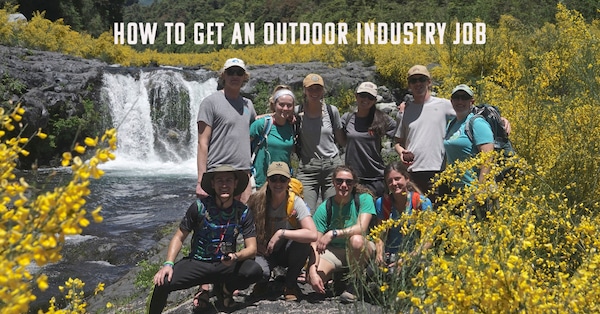For anyone interested in a career in the outdoor education, adventure programming, and guiding sectors of the outdoor industry, there are many trails to reach your destination. Among these are university recreation programs, internships, seasonal employment and more.
Not all pathways in this wide and diverse industry necessarily require a recreation-specific degree. However, an associate’s or bachelor’s degree offers job seekers a leg up when it comes to qualifying for an administrative position, as well as positions in environmental education or academia.
And while a college degree is helpful and even required in some sectors of this great outdoor industry of ours, what this industry truly values most is hands-on experience. That experience — in combination with holding the relevant certifications — is the key to successful advancement in outdoor education and adventure programming employment.

Gaining real-world experience is essential, whether you’re pursuing a college degree or not. And one of the best ways to jump start your outdoor industry career is to find seasonal employment working in the field. Taking a part-time or summer job offers a great opportunity to start gaining the needed experience.
Types of Outdoor Industry Organization
Seasonal opportunities abound, including through the following types of organizations:
- Adventure programming centers accredited by the Association for Experiential Education (AEE)
- Adventure-based physical education programs
- Backcountry outfitter and guide services that hire American Mountain Guides Association (AMGA) certified guides
- Challenge course construction companies that hire Association for Challenge Couse Technology (ACCT) certified instructors
- Climbing schools accredited by AMGA
- College and university outdoor recreation programs that are members of AORE
- Conference centers
- Corporate team building and training firms accredited by AEE
- K-12 public, private, and independent schools accredited by AEE
- Indoor climbing centers that hire Climbing Wall Association (CWA) certified instructors
- Outdoor education centers accredited by AEE
- Science schools
- State, local, and national park systems
- Summer camps accredited by the American Camp Association (ACA)
- Wilderness and adventure programs that are accredited by AEE
- Wilderness and backcountry therapy programs that are AEE-OBH accredited
- Wilderness education organization and schools that hire Wilderness Education Association (WEA) certified outdoor leaders and educators
- Wilderness skills and survival schools
For example, if you’re interested in becoming a backcountry guide, one way to get started is to find a seasonal position with an AEE or ACA accredited adventure programming organization or summer camp that has a trip and travel program.
Additionally, if you already know of a specific activity or population that interests you, discuss that interest during your interview, or with your employer once you’ve been hired. In the case of the desire to become a backpacking guide, you should find a seasonal position with an organization that has a backpacking trip and travel program. If you express interest, it’ll become much more likely that you’ll get the opportunity to work in some capacity within that backpacking program.
Others gain needed experience in the field through internships or AmeriCorps positions. While these positions are generally underpaid and sometimes even un-paid, they offer invaluable hands-on experience. If you can cut your expenses for a season and get by making less money, the real-work experience and skills you gained can definitely pay off when you are looking for your next job.
For relevant certifications, those recommended at a minimum are Wilderness First Responder (WFR), First Aid and CPR certification. If you already know you want to work in remote areas on backcountry programs, earning your WFR certification will be extremely valuable. You may also want to consider additional certifications based on your areas of interest, such as a Leave No Trace trainer or Master Educator certification, ACA paddling certifications, AMGA rock climbing certifications, American Red Cross lifeguarding, and more.
Additionally, you can sign up for outdoor educator or adult leadership training courses with a number of outdoor companies.
Here at The National Center for Outdoor & Adventure Education (NCOAE), we offer 14- and 25-day Adult Leadership Expeditions that enable participants to gain the experience needed to begin their outdoor industry careers and build upon existing technical outdoor skills. Courses currently take place in North Carolina, Alaska, Pacific Northwest, Patagonia, and Ecuador.
NCOAE Adult leadership courses often include:
- Backcountry field experience in backpacking, rock climbing, and/or paddling
- Expedition planning, wilderness risk management, and backcountry navigation
- Wilderness camp craft, including backcountry cooking and food planning
- Training in NCOAE’s core curriculum for educators, teachers, and trip leaders
- Solo experiences for reflecting and enjoy the peaceful solitude of wilderness
- Leave No Trace (LNT) wilderness ethics training
Most important, if you’re looking to begin a career in the outdoor industry, don’t be afraid to jump in and get started. Ask around to find local organizations that are hiring, and don’t forget the impact of networking in your job search.
None of this is easy, but experiencing meaningful, life-changing outdoor adventures in pursuit of a career, is well worth the planning and work you put into it.
= = = = = = = = =
About the Author: Elizabeth Shirley, WFR, is the Director of Outdoor Education at The National Center for Outdoor & Adventure Education (NCOAE). She joined NCOAE in the spring of 2017 as a program director, and now oversees the safety, quality, and educational effectiveness of NCOAE’s field courses. Liz brings 17 years of youth development and outdoor education experience to NCOAE — much of it with the Girl Scouts.
TALK TO US
Have any further questions about our courses, what you’ll learn, or what else to expect? Contact us, we’re here to help!
Leave a comment